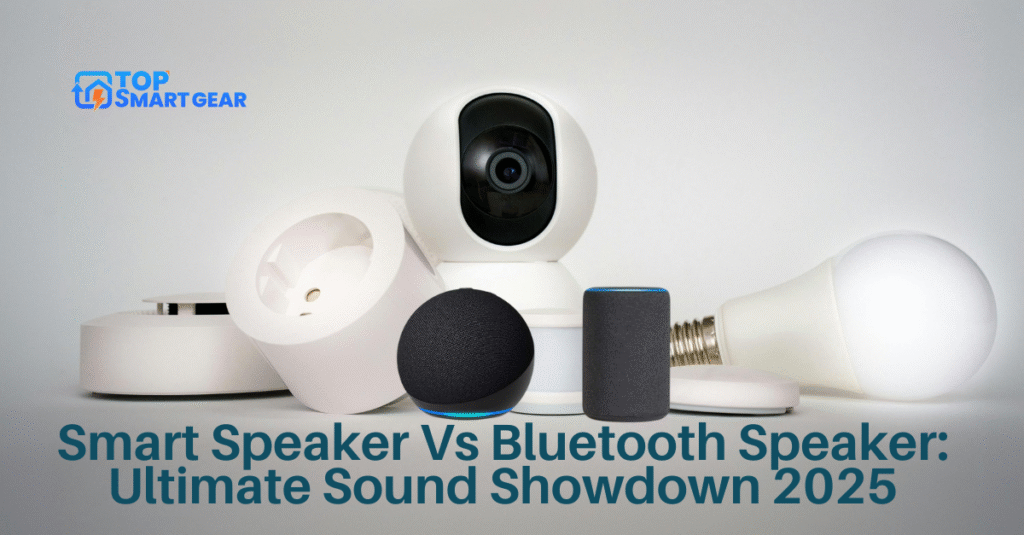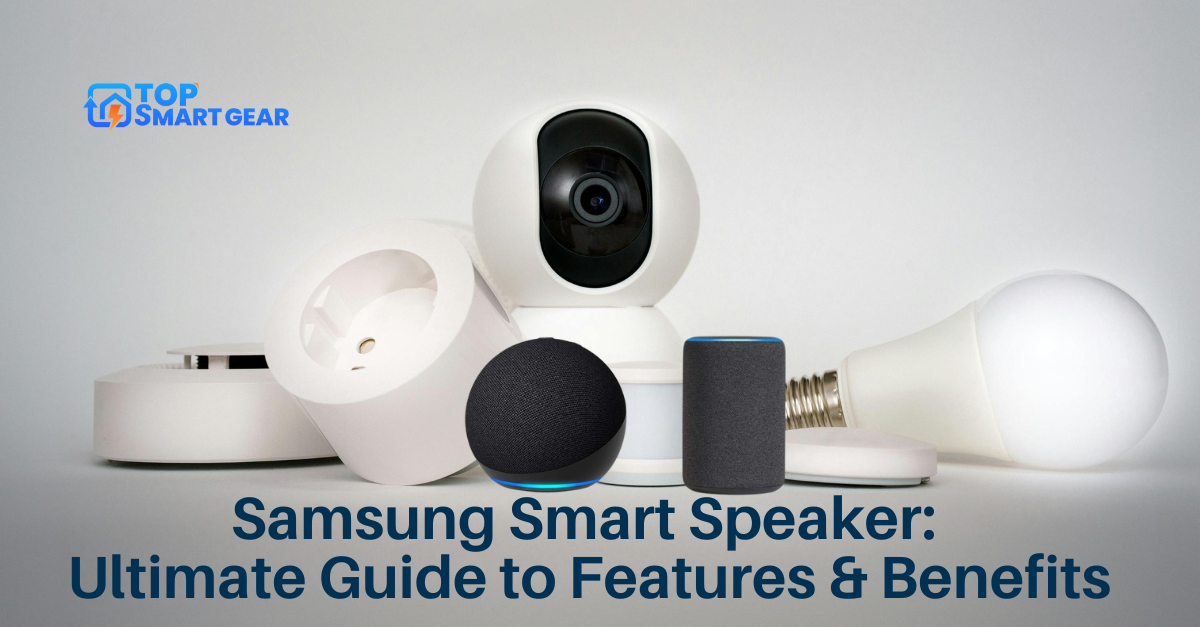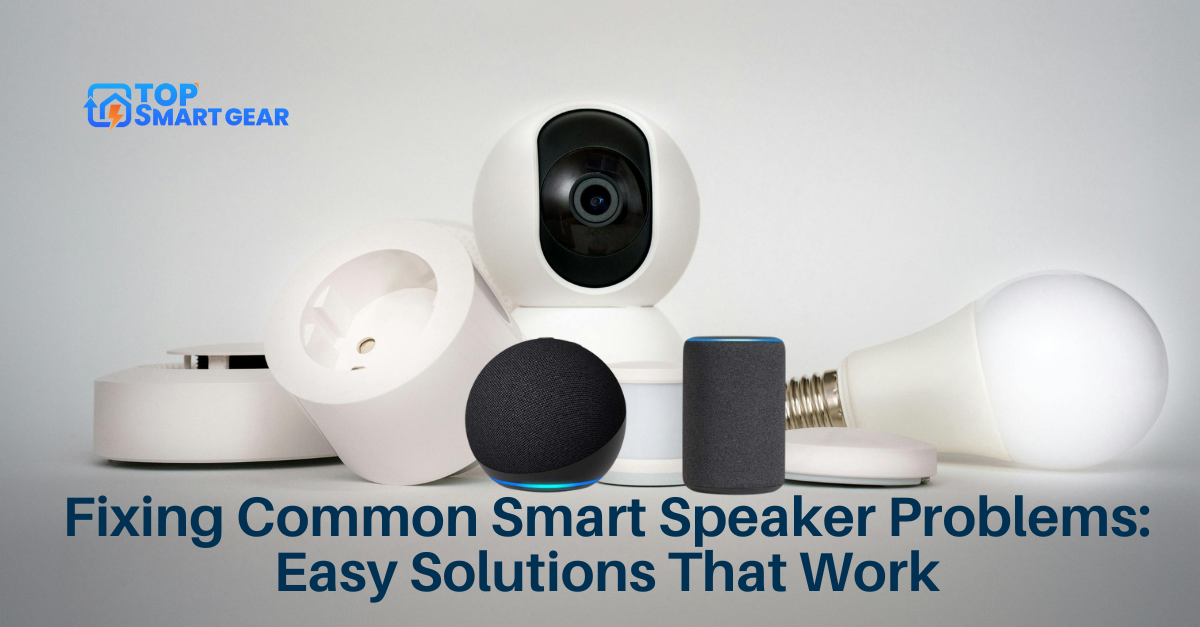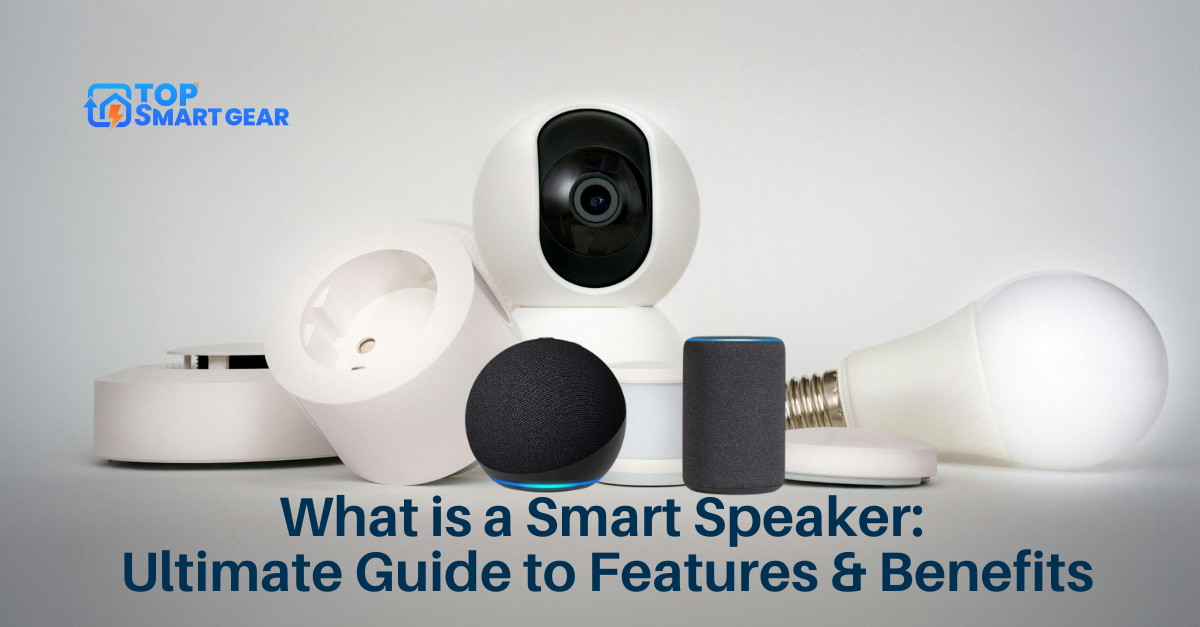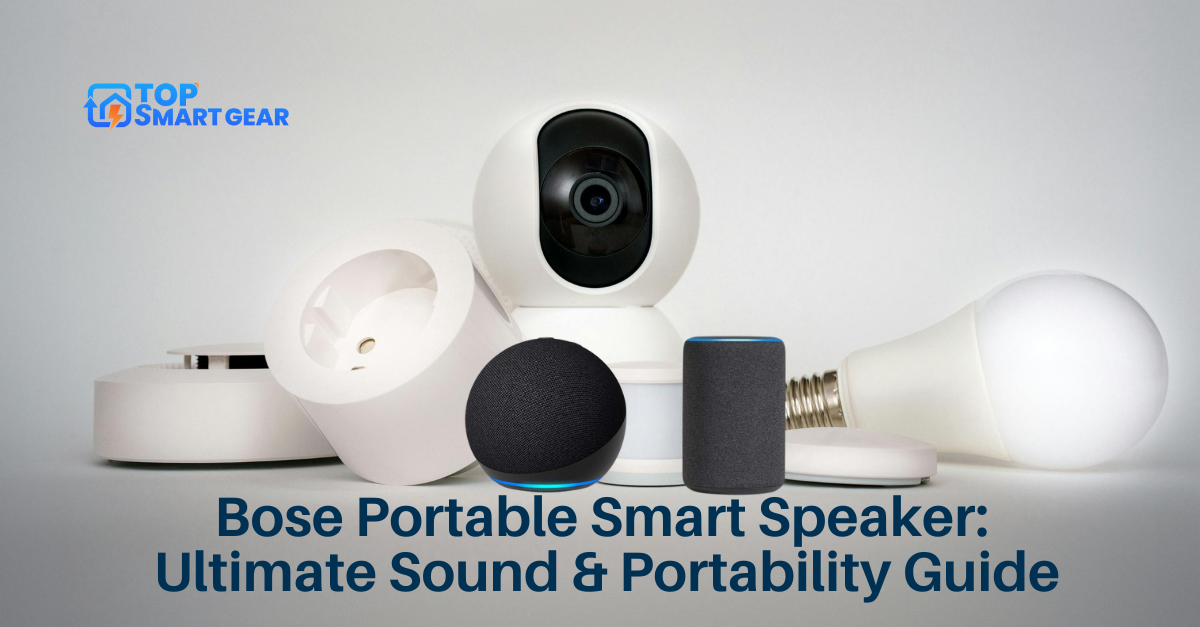Confused about Smart Speaker Vs Bluetooth Speaker? You’re not alone. Choosing between them can be overwhelming with so many options available.
Both devices can fill your room with sound, but they do much more than play music. Choosing the right one can change how you enjoy your favorite tunes, control your smart home, or even manage your daily tasks. By the end of this article, you’ll clearly understand which speaker fits your lifestyle and why.
Ready to find the perfect match for your needs? Let’s dive in.
Smart Speaker Features
Smart speakers offer more than just sound output. Their features set them apart from regular Bluetooth speakers. Understanding the advantages of smart speakers helps you choose the correct device. These devices do more than play music. They respond to voice commands, connect to the internet, and control smart home gadgets. Let’s explore the main features that make smart speakers unique.
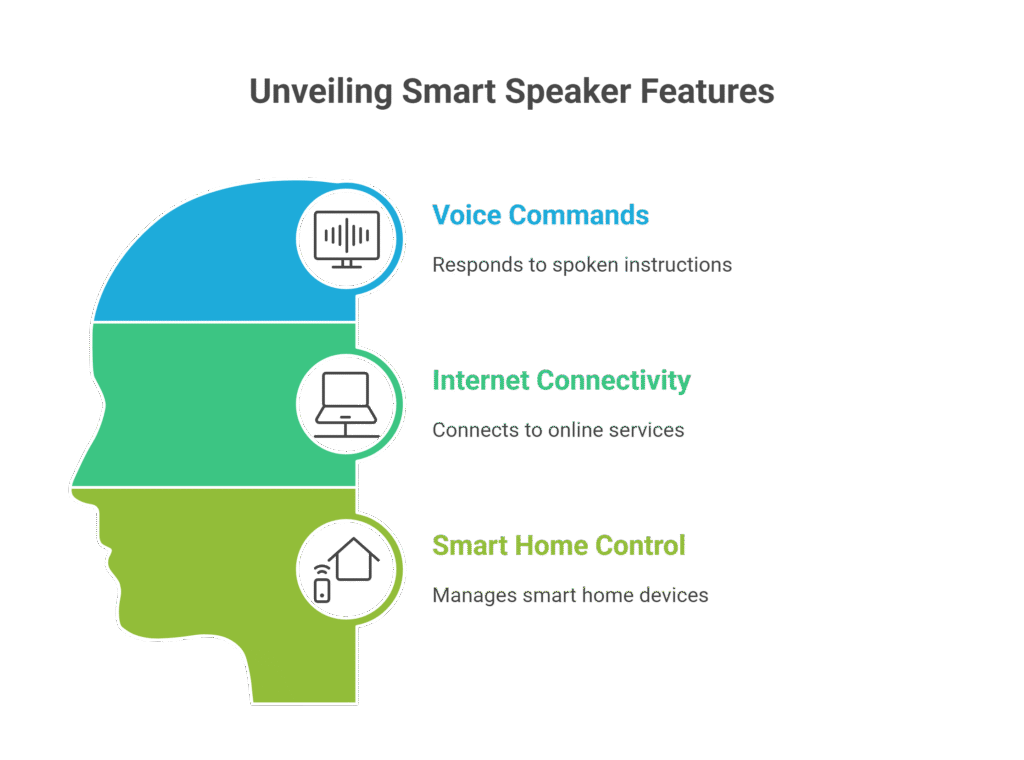
Voice Assistant Integration
A defining feature in the Smart Speaker Vs Bluetooth Speaker comparison is the built-in voice assistant. Smart speakers integrate platforms like Alexa, Google Assistant, or Siri, enabling users to control the device and access services through simple, hands-free voice commands. This level of integrated intelligence is a primary differentiator that sets the two categories apart.
- Answer questions: Ask for the weather, news, or facts.
- Control music: Play, pause, skip, or change volume with voice.
- Set reminders and alarms: Manage daily tasks efficiently.
- Send messages: Dictate and send texts or calls.
- Language support: Many assistants support multiple languages.
Voice assistant integration makes smart speakers practical and interactive. It turns the speaker into a personal helper at home.
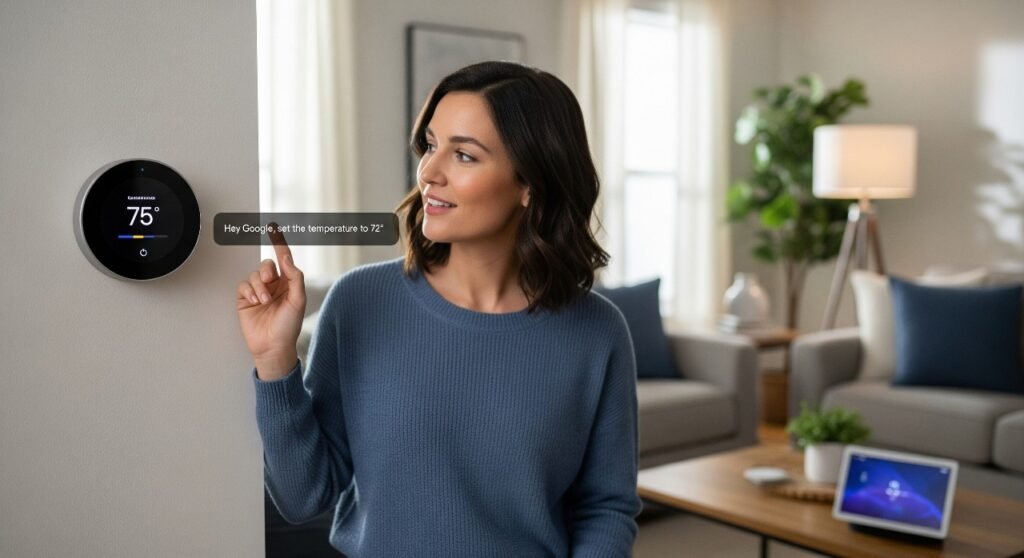
Smart Home Compatibility
Smart speakers connect with various smart home devices. This compatibility expands their use beyond just playing music. They act as a central hub for managing home gadgets.
Typical smart home devices compatible with smart speakers include:
- Smart lights
- Thermostats
- Security cameras
- Door locks
- Smart plugs
Users can control these devices with simple voice commands or through an app. This feature offers convenience and saves time.
| Smart Device | Control Options | Benefits |
|---|---|---|
| Smart Lights | Voice, app | Adjust brightness, colors, and on/off remotely |
| Thermostats | Voice, app | Set temperature, save energy |
| Security Cameras | Voice, app | Monitor home, receive alerts |
Internet Connectivity
An internet connection is essential for smart speakers. This feature enables the device to access online services and stay up to date. It also allows voice assistants to process commands.
Smart speakers connect via Wi-Fi or, in some cases, Ethernet. Unlike Bluetooth speakers, which only connect to nearby devices, smart speakers require an internet connection to work fully.
- Streaming services: Access Spotify, Apple Music, and more.
- Online updates: Receive software and security updates automatically.
- Cloud processing: Voice commands are sent to cloud servers for faster response times.
- Multi-room audio: Play synchronized music across several smart speakers.
This connectivity is a core advantage of smart speakers. It allows constant improvements and access to a wide range of features not available on Bluetooth speakers.
Bluetooth Speaker Features
Bluetooth speakers are popular for their ease of use and wireless convenience. They connect to devices without cables, making music playback simple and flexible. Understanding the key features of Bluetooth speakers helps to see how they differ from smart speakers. These features include portability, battery life, and device compatibility, which directly impact user experience. This section explores these important aspects in detail.
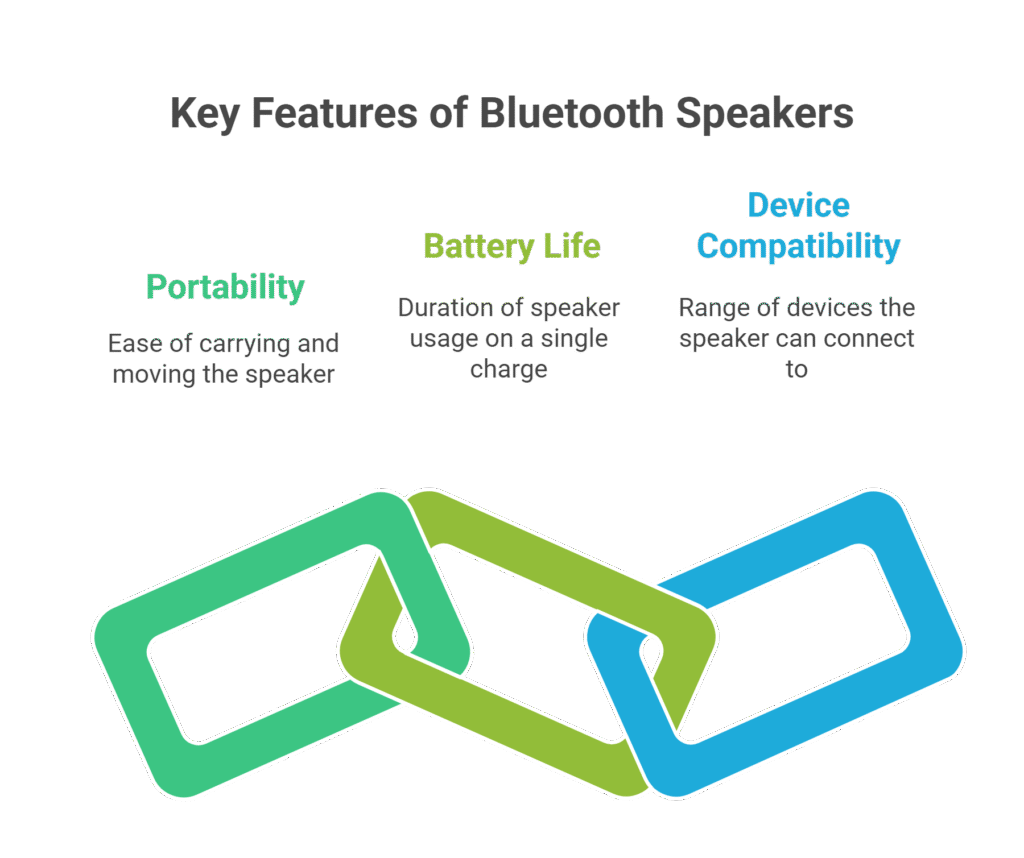
Portability And Design
Bluetooth speakers are designed to be easy to carry and use anywhere. Most models are small, lightweight, and fit in backpacks or even pockets. This makes them perfect for outdoor activities, travel, or moving around the house.
- Compact size: Many Bluetooth speakers are small enough to hold in one hand.
- Durability: Some have rugged designs, water resistance, or shockproof features.
- Variety of styles: Options range from sleek, modern designs to colorful, fun shapes.
Portability often depends on the speaker’s shape and weight. For example, cylindrical speakers fit easily in cup holders, while flat, square designs stack well in bags. Manufacturers also focus on materials, using rubber or silicone for grip and protection.
| Feature | Benefit |
|---|---|
| Lightweight | Easy to carry all day without fatigue |
| Water-resistant | Safe to use near pools or in rain |
| Compact design | Fits in small bags and pockets |
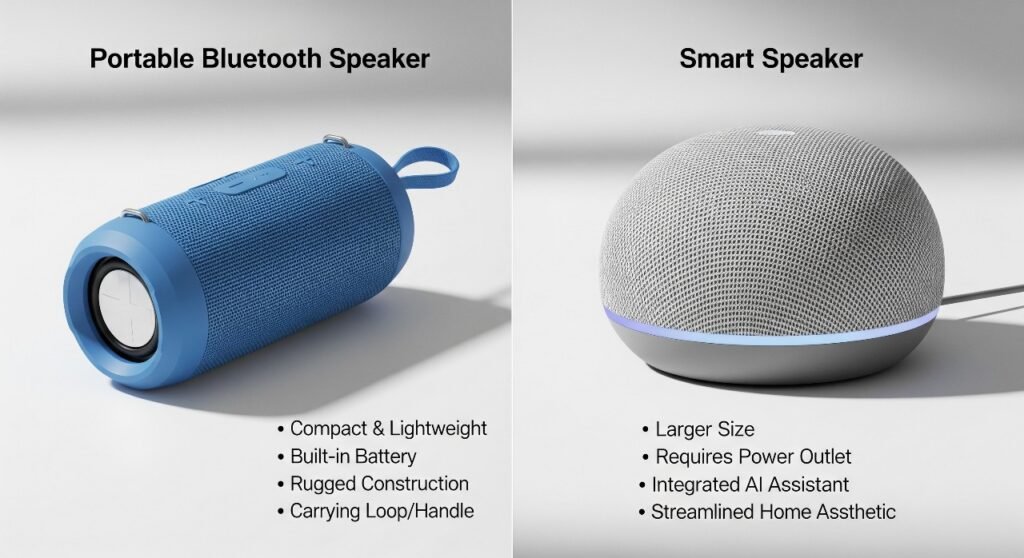
Battery Life
Battery life is a key factor for Bluetooth speakers. It determines how long you can listen to music before you need to charge. Most portable Bluetooth speakers offer between 6 and 24 hours of playback on a full charge.
Longer battery life suits outdoor use, trips, or long days without access to power. Shorter battery life may work well for home or office settings where charging is easy.
- Average playtime: 8 to 12 hours for many mid-range models.
- Fast charging: Some speakers recharge in 2 to 3 hours.
- Battery type: Most use lithium-ion batteries for better capacity and lifespan.
Battery performance can vary with volume levels and speaker features. Higher volume or bass may reduce battery life. Some speakers include power-saving modes to extend playtime.
| Speaker Model | Battery Life (hours) | Charging Time (hours) |
|---|---|---|
| Model A | 10 | 3 |
| Model B | 15 | 2.5 |
| Model C | 20 | 4 |
Device Compatibility
Bluetooth speakers work with many devices. They connect wirelessly to smartphones, tablets, laptops, and more. Compatibility depends on Bluetooth version and supported profiles.
Most speakers use Bluetooth 4.0 or higher, which supports better range and sound quality. They work with devices running Android, iOS, Windows, and macOS.
- Universal connection: Pair with almost any Bluetooth-enabled device.
- Multi-device support: Some speakers connect to two or more devices at once.
- Easy pairing: Simple setup with button press or automatic detection.
Besides Bluetooth, some models have auxiliary (AUX) input or USB ports. These options allow connecting non-Bluetooth devices or playing audio directly from USB drives.
| Connection Type | Device Examples | Notes |
|---|---|---|
| Bluetooth | Smartphones, Tablets, Laptops | Wireless, easy pairing |
| AUX Input | MP3 Players, Older Devices | Wired connection, universal |
| USB Port | Flash Drives, Some Phones | Direct playback from storage |
Audio Quality Comparison
A critical aspect of the Smart Speaker Vs Bluetooth Speaker decision is audio performance. Sound quality is fundamental to enjoying music, podcasts, or calls, and each type offers a distinct auditory experience. Understanding their respective strengths in clarity, bass, volume, and dynamic range is essential for making an informed choice. This guide will break down the performance of each to help you determine which speaker better meets your audio priorities.
Sound Clarity And Bass
Sound clarity and bass are crucial for a good listening experience. Smart speakers often focus on clear voices and balanced sound. They use software to enhance voice recognition and reduce background noise. This makes them ideal for spoken content such as news or podcasts.
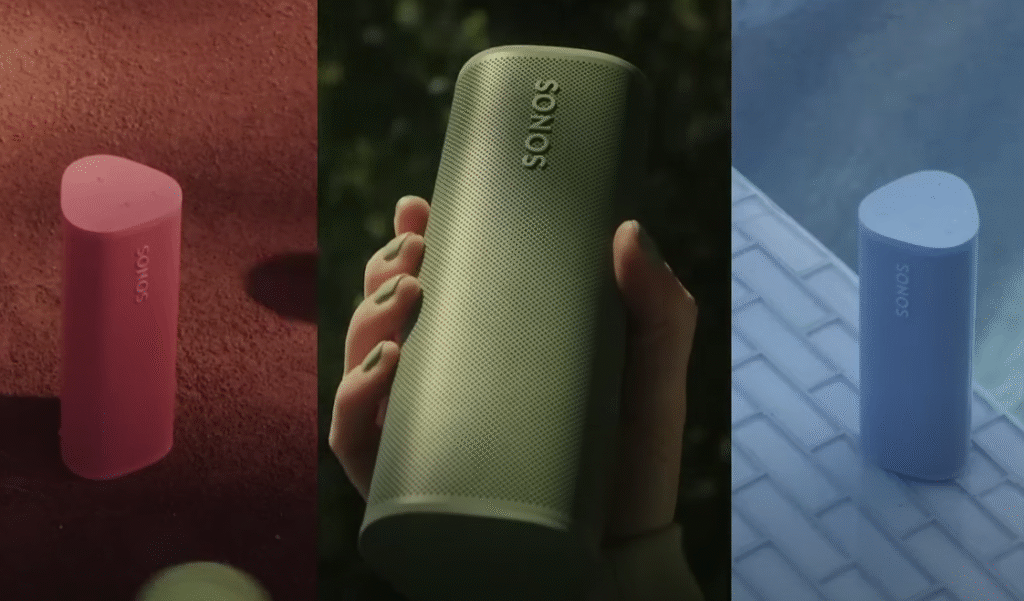
Bluetooth speakers usually prioritize music quality. They offer richer bass and fuller sound. Many models feature larger drivers or passive radiators to enhance low-frequency performance. This gives a deeper, punchier bass sound compared to most smart speakers.
| Feature | Smart Speaker | Bluetooth Speaker |
|---|---|---|
| Sound Clarity | Clear vocals, good for speech | Clear but focused on music tones |
| Bass | Moderate, balanced bass | Stronger, deeper bass |
| Audio Processing | Software-enhanced sound | Hardware-focused sound |
In summary, smart speakers excel at speech clarity and command understanding. Bluetooth speakers deliver better bass for music lovers. Deciding which is better, a smart or Bluetooth speaker, depends on your primary use.
Volume And Range
Volume and range affect how loud and far the sound carries. Bluetooth speakers usually have higher maximum volume levels. They are designed for outdoor use and parties. Many models can fill large rooms or open spaces with sound.
Smart speakers tend to have lower volume limits. They are optimized for indoor use and small spaces. Their sound range is more focused and less wide. This helps with voice recognition and reduces echo.
- Bluetooth Speaker: louder sound, wider range, better for big areas
- Smart Speaker: moderate volume, focused sound, ideal for small rooms
Check this table for a quick comparison:
| Aspect | Smart Speaker | Bluetooth Speaker |
|---|---|---|
| Max Volume | Lower, good for quiet rooms | Higher, suitable for parties |
| Sound Range | Focused, limited range | Wide, covers large spaces |
| Usage Environment | Indoor, close listening | Indoor and outdoor, distant listening |
For loud, wide sound, Bluetooth speakers perform better. For clear sound in smaller spaces, smart speakers work well. Deciding which is better, a smart or Bluetooth speaker, depends on where and how you listen.
User Experience
The core distinction in the Smart Speaker Vs Bluetooth Speaker comparison lies in how they shape the user experience. While both play audio, they offer fundamentally different models for interaction and control. This experience encompasses everything from the simplicity of setup to the methods of daily use and the degree of personalization available. Understanding these experiential differences is key to determining which device will best align with your daily routines and expectations.
Ease Of Setup
Setting up a Bluetooth speaker is usually straightforward. Most models require just turning on the speaker and pairing it with a phone or computer via Bluetooth. This process is quick and simple, often taking less than a minute.
- Turn on the speaker
- Enable Bluetooth on your device
- Select the speaker from the device list
- Start playing music
Smart speakers, on the other hand, need more steps. They connect to Wi-Fi and often require downloading an app to complete the setup. The app guides you through linking accounts and setting preferences. This can take a few minutes, but it allows more functions.
| Feature | Bluetooth Speaker | Smart Speaker |
|---|---|---|
| Setup Time | Less than 1 minute | 3-5 minutes |
| Connection Type | Bluetooth only | Wi-Fi and Bluetooth |
| Required Apps | Usually no | Yes, for configuration |
Ease of setup varies based on user needs. Bluetooth speakers suit those wanting quick use. Smart speakers take longer to set up but unlock extra features.
Control Options
Control options show a clear difference between smart and Bluetooth speakers. Bluetooth speakers usually rely on physical buttons or controls on the device. Volume, play, pause, and skip are controlled manually or with the connected device.
- Buttons on the speaker
- Controls from phone or tablet
- Limited voice commands, if any
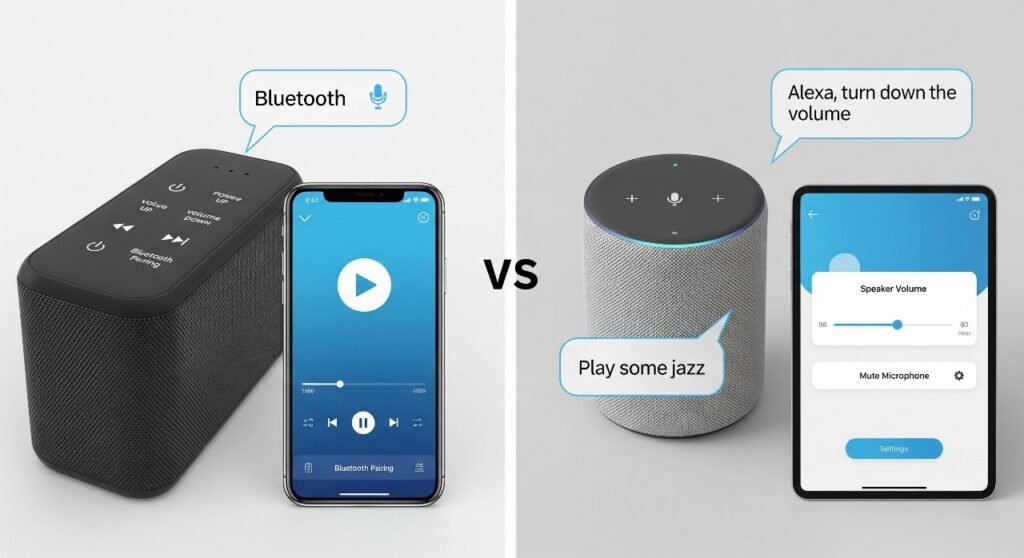
Smart speakers offer multiple control methods. Voice commands are the most common way to interact. Users can also use apps or physical buttons. Voice control allows hands-free operation, making it easy to change music, ask questions, or control other smart devices.
- Voice commands (e.g., “Play jazz music”)
- App control for advanced settings
- Physical buttons for basic functions
| Control Method | Bluetooth Speaker | Smart Speaker |
|---|---|---|
| Physical Buttons | Yes | Yes |
| App Control | Sometimes | Yes |
| Voice Commands | No or Limited | Yes |
Control options on smart speakers offer greater freedom and convenience. Bluetooth speakers keep controls direct and straightforward.
Customization
Customization also highlights the difference between smart and Bluetooth speakers. Bluetooth speakers have limited customization. Users can adjust volume and, on some devices, equalizer settings on their connected device. The speaker itself usually has no further options.
- Volume control
- Basic sound adjustments via phone or app (rare)
Smart speakers offer deeper customization. Users can change voice assistant settings, link music services, set alarms, and manage smart home devices. Many smart speakers allow you to create routines or custom commands. This enhances the user experience by adapting to individual preferences.
- Personalized voice assistant settings
- Multiple linked accounts and services
- Smart home automation routines
- Custom wake words and commands
The table below compares customization features:
| Customization Feature | Bluetooth Speaker | Smart Speaker |
|---|---|---|
| Sound Settings | Limited | Advanced (via app) |
| Voice Assistant | No | Yes |
| Smart Home Integration | No | Yes |
| Custom Commands | No | Yes |
Customization in smart speakers makes them more flexible for daily use. Bluetooth speakers suit users who prefer simplicity.
Price And Value
The choice in the Smart Speaker Vs Bluetooth Speaker debate is often a question of price and value. While both offer unique benefits, their cost structures and what you receive for your investment differ significantly. Understanding this financial distinction is key to deciding which device best fits your budget and needs. Ultimately, the price difference reflects a fundamental trade-off between the portability of a Bluetooth speaker and the integrated features and convenience of a smart speaker..
Cost Differences
Bluetooth speakers usually cost less than smart speakers. Basic models start around $20 and go up to $150. Smart speakers often start at around $50 and can cost up to $200 for premium models. The price gap exists because smart speakers have added features such as voice assistants and Wi-Fi connectivity.
- Bluetooth speakers focus on simple wireless audio playback.
- Smart speakers include features like voice control, smart home integration, and internet access.
Here is a quick price comparison:
| Type | Starting Price | Top-end Price | Main Use |
|---|---|---|---|
| Bluetooth Speaker | $20 | $150 | Portable music playback |
| Smart Speaker (WiFi) | $50 | $250+ | Voice commands, smart home control |
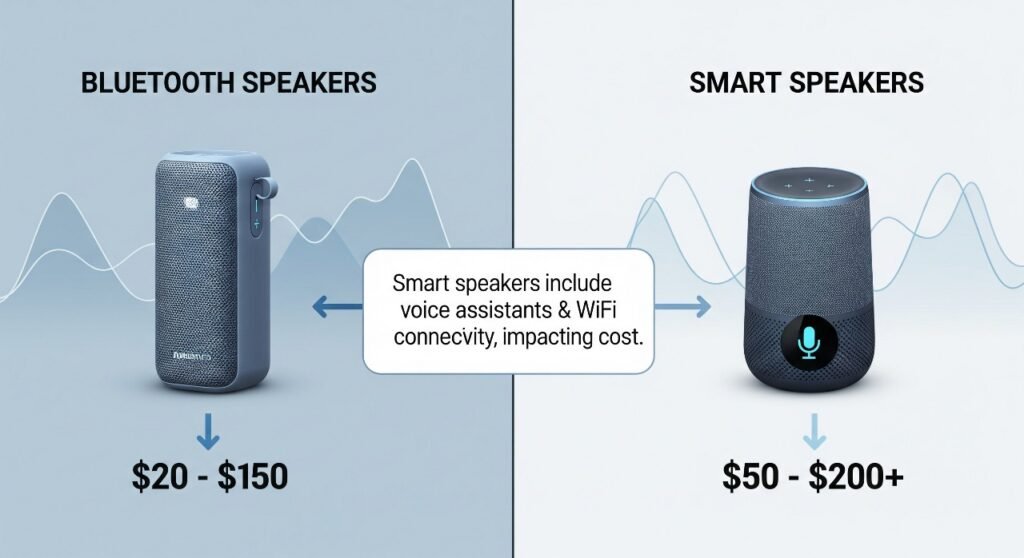
Cost depends on brand, sound quality, and additional features. Bluetooth speakers suit those who want easy, portable sound without extra tech. Smart speakers are ideal for users who wish for hands-free control and internet access. Price should match your intended use and preferred features.
Feature-to-price Ratio
Evaluating the feature-to-price ratio helps find the best value. Bluetooth speakers offer straightforward audio at a low price. Their simplicity means fewer features but reliable performance. Smart speakers provide more functions, adding value despite higher prices.
Consider these points:
- Bluetooth models prioritize portability and ease of use.
- Smart speakers support multiple functions like voice assistants, timers, and smart home gadgets.
- Smart speakers may also stream music directly over Wi-Fi, improving sound quality and convenience.
Here’s a breakdown of features and value:
| Feature | Bluetooth Speaker | Smart Speaker (WiFi) |
|---|---|---|
| Wireless Audio | Yes (Bluetooth) | Smart Speaker (Wi-Fi) |
| Voice Assistant | No | Yes (Alexa, Google, etc.) |
| Smart Home Control | No | Yes |
| Portability | High | Medium |
| Price Range | Low | Medium to High |
Choosing the right speaker depends on your priorities. If you want simple, affordable audio, Bluetooth speakers offer excellent value. If innovative features and voice control matter more, smart speakers justify their higher cost. Understanding the feature-to-price ratio helps select the best speaker for your needs and budget.
Use Case Scenarios
The decision in the Smart Speaker Vs Bluetooth Speaker debate largely depends on your specific lifestyle and environment. Each type excels in different scenarios, making it crucial to match the device to your primary activities. Understanding these distinct use cases is key to choosing the right audio solution. Let’s explore the ideal settings for each device to guide your choice.
Home Use
Smart speakers shine in home settings. They do more than play music; they act as personal assistants. You can control smart home devices, set reminders, and get news updates by voice commands. This makes them perfect for hands-free convenience.
Bluetooth speakers work well at home too, especially for music lovers who want simple, clear sound without extra features. They connect easily to phones or computers and do not need Wi-Fi.
- Smart Speaker Benefits at Home:
- Voice control for music and smart devices
- Access to news, weather, and calendar
- Multi-room audio support
- Bluetooth Speaker Benefits at Home:
- Easy pairing with many devices
- Good sound quality for casual listening
- Portable within the house
| Feature | Smart Speaker | Bluetooth Speaker |
|---|---|---|
| Voice Control | Yes | No |
| Smart Home Integration | Yes | No |
| Sound Quality | Moderate to good | Good to excellent |
| Connectivity | Wi-Fi, Bluetooth | Bluetooth only |
Outdoor Use
Bluetooth speakers excel outdoors. Their wireless design and battery power allow easy movement. They resist water and dust better, making them ideal for parks, beaches, or picnics.
Smart speakers usually need Wi-Fi and power plugs, limiting outdoor use. Some newer models have batteries, but their smart features may be limited outside the home.
- Bluetooth Speaker Strengths Outdoors:
- Wireless and portable
- Durable and weather-resistant
- Good battery life
- Smart Speaker Limitations Outdoors:
- Needs Wi-Fi for full use
- Less portable and often needs power
- Risk of damage in harsh weather
| Aspect | Bluetooth Speaker | Smart Speaker |
|---|---|---|
| Portability | High | Low to medium |
| Weather Resistance | Often water/dust proof | Usually not |
| Battery Life | Long-lasting | Short or none |
| Smart Features | Limited | Full with Wi-Fi |
Travel
When it comes to travel, the Smart Speaker Vs Bluetooth Speaker debate centers on portability and convenience. Bluetooth speakers clearly take the lead for travelers. They’re compact, lightweight, and easy to carry in a backpack or suitcase. These speakers connect instantly to smartphones and work perfectly without any internet access. Plus, their long-lasting battery life makes them ideal for road trips, picnics, and outdoor adventures.
Smart speakers, however, are less suited for travel. They tend to be bulkier and require a stable Wi-Fi connection to access voice assistants and smart features. Still, some travelers use portable smart speakers during hotel stays or business trips where Wi-Fi is readily available.
In short, if mobility and battery life are your priorities, Bluetooth speakers win. But if you prefer smart features and don’t mind carrying a bit more weight, a smart speaker can still be useful on the go.
- Bluetooth Speakers for Travel:
- Compact and lightweight
- Easy Bluetooth pairing
- Strong battery performance
- Works offline
- Smart Speakers for Travel:
- Need Wi-Fi for innovative functions
- Heavier and less portable
- Suitable for hotel or office use
| Travel Factor | Bluetooth Speaker | Smart Speaker |
|---|---|---|
| Size | Small and light | Medium to large |
| Internet Dependency | No | Yes |
| Battery Life | Long | Short |
| Ease of Use | Simple | Moderate |
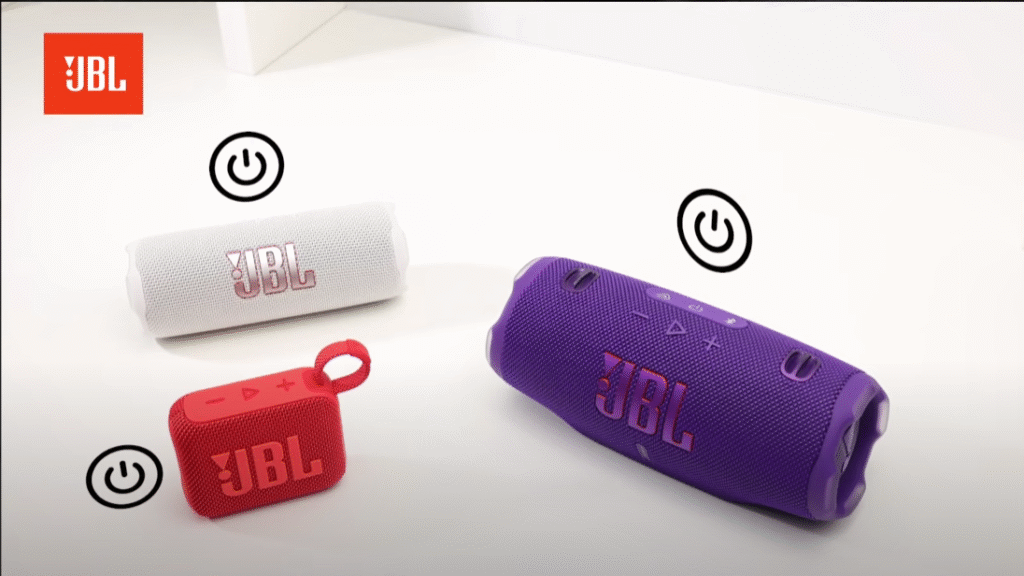
Privacy And Security: Smart Speaker Vs Bluetooth Speaker
The choice in the voice assistant speaker vs Bluetooth speaker debate often comes down to privacy and security. While both devices play audio, a key distinction is that smart home speakers are designed to listen for wake words and maintain a constant internet connection. This core functionality, central to the smart speaker vs wireless Bluetooth speaker comparison, raises different concerns for your personal data. Understanding these differences is essential for making the right choice for your home and family.
Data Collection Concerns
Smart speakers collect data to work properly. They record your voice commands and send them to cloud servers for processing. This means your conversations might be stored or analyzed by companies.
Key data collection issues include:
- Continuous Listening: Smart speakers often remain in “listening mode” to detect wake words, which can unintentionally capture sounds.
- Data Storage: Voice commands and usage patterns are stored on company servers.
- Third-Party Sharing: Some companies share data with partners or advertisers.
Bluetooth speakers do not have internet connections. They only play sound from paired devices. This means they do not collect or store personal data. They offer a higher level of privacy by design.
| Feature | Smart Speaker | Bluetooth Speaker |
|---|---|---|
| Internet Connection | Yes | No |
| Data Collection | Yes | No |
| Stores Voice Commands | Yes | No |
| Privacy Risk | Higher | Lower |
Voice Command Risks
Smart speakers respond to voice commands. They must always listen for a wake word, like “Hey Alexa” or “OK Google.” This listening can cause security risks.
Possible risks with voice commands:
- Accidental Activation: Devices may activate without your permission, recording private conversations.
- Unauthorized Access: Someone else could control your smart speaker with voice commands.
- Voice Spoofing: Hackers can use recorded voices to trick the device.
Bluetooth speakers do not listen or respond to voice. They only play audio sent from your phone or computer. This means no risks of accidental activation or voice hacking.
Tips to reduce voice command risks on smart speakers:
- Turn off the microphone when not in use.
- Review and delete stored voice recordings regularly.
- Set up voice recognition to allow only trusted users.
- Keep the device software updated to fix security issues.
Frequently Asked Questions
What Is The Main Difference Between a Smart Speaker Vs Bluetooth Speaker?
Smart speakers have voice assistants and internet connectivity. Bluetooth speakers primarily play audio from devices via Bluetooth. Smart speakers offer hands-free control and smart home integration. Bluetooth speakers focus on portability and direct audio playback, with few innovative features.
Can Bluetooth Speakers Work Without an Internet Connection?
Yes, Bluetooth speakers do not require an internet connection. They connect directly to devices via Bluetooth. This makes them ideal for offline use. Smart speakers usually require an internet connection for full functionality, such as voice commands.
Are Smart Speakers Better For Home Automation?
Yes, smart speakers integrate seamlessly with smart home devices. They control lights, thermostats, and more using voice commands. Bluetooth speakers lack this automation capability. Smart speakers enhance convenience in connected homes.
Which Speaker Offers Better Sound Quality?
Sound quality depends on the model, not the type. Both smart and Bluetooth speakers vary in audio performance. High-end models in either category can deliver excellent sound. Check speaker specifications and reviews for sound quality.
Conclusion
When comparing Smart Speaker Vs Bluetooth Speaker, it’s clear that each serves a different purpose. Smart speakers offer voice control, smart home integration, and hands-free convenience, perfect for those who love automation and easy control. In contrast, Bluetooth speakers focus on simplicity, portability, and great sound on the go.
Your choice between a voice assistant speaker vs Bluetooth speaker should depend on your lifestyle and daily needs. If you want a device that helps manage tasks, answer questions, and control other smart home devices, go for a smart home speaker. But if you prefer something compact for travel, parties, or outdoor use, a portable Bluetooth speaker is ideal.

